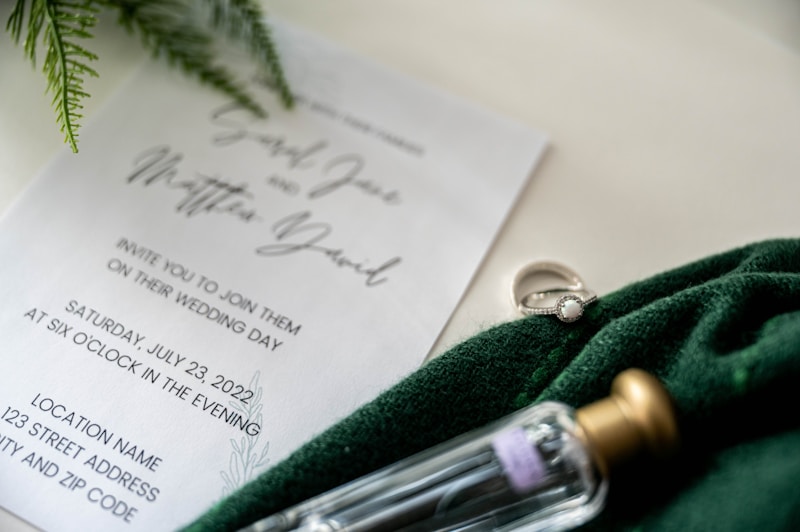Red Flags to Watch for in Wedding Contracts: Ensure Your Special Day is Protected
Red Flags to Watch for in Wedding Contracts: Ensure Your Special Day is Protected
Planning a wedding is one of the most exciting yet stressful experiences a couple can undertake. After months of dreaming about the perfect day, the last thing you want is to encounter unexpected pitfalls with vendors, services, and contracts. With the wedding industry projected to be worth over $76 billion in the U.S. alone, understanding red flags to watch for in wedding contracts is essential to ensuring a seamless celebration. In this article, we’ll delve into the critical aspects of wedding contracts that you should be cautious about, helping you avoid common traps.
Understanding Wedding Contracts
A wedding contract is a legally binding agreement between you and a vendor. This contract outlines the services to be provided and the corresponding payments. While most vendors are trustworthy, it’s crucial to recognize potential issues that could arise. Here are some terms and clauses you'll need to scrutinize before signing on the dotted line:
| Common Red Flags | Description |
| Vague Terms | A lack of clarity in the contract can lead to misunderstandings. |
| No Refund Policy | Be cautious of vendors that do not offer a refund or cancellation policy. |
| Last-Minute Changes | Make sure the contract specifies what happens if terms change. |
| Excessive Fees | Look out for hidden charges that can inflate your overall cost. |
| Lack of Communication Timeline | Communicate timelines to prevent stress leading up to the wedding day. |
Common Red Flags in Wedding Contracts
1. Vague Terms
One of the first red flags to watch for in wedding contracts is vague language. If the services outlined in the contract are not clearly defined, you might find yourself in a sticky situation later. For example, if a photographer promises "unlimited coverage," what does that mean? Clarify specifics regarding the start and end times, as well as the number of images provided.
2. No Refund Policy
A wedding is a significant investment, and many vendors require deposits to secure your date. But be wary of contracts that do not have a clear refund policy. Understand what your financial responsibilities are if you need to cancel or postpone your wedding—for instance, if you decide to switch venues two months before the big day.
3. Last-Minute Changes
Sometimes vendors might change their offerings based on availability or unforeseen circumstances. Your contract should include a clause that ensures you're informed about any changes well in advance. This will help you avoid surprises the week of your wedding.

4. Excessive Fees
Pay close attention to any potential hidden fees. These can include overtime charges for photographers, setup fees for florists, or additional charges for extra guests. Make sure you ask all the pertinent questions upfront and ensure that the contract details what you’ll be paying, down to the last cent.
5. Lack of Communication Timeline
The absence of an established communication timeline can be problematic. You should collaborate with your vendors to create a clear schedule for when decisions need to be made and when you will communicate about various planning aspects. This will help all parties stay on the same page.
Questions to Ask Before Signing Wedding Contracts
It’s crucial to have an open dialogue with your vendors to ensure you’re both on the same wavelength. Here’s a list of questions to ask:
- What happens if you get sick or can't make it to our wedding?
- Do you have liability insurance?
- Can you provide references from previous clients?
- What is your cancellation or rescheduling policy?
- How do you handle disputes or misunderstandings?
State-Specific Considerations
Depending on where you're located, there may be different laws in place to protect consumers. For example, California mandates that services promised in a contract must match what was delivered, allowing you to take legal action if this is not upheld. Always familiarize yourself with your local consumer protection laws before signing any agreements.
Document Thoroughly
As a couple, it’s essential to document every interaction you have with vendors. Keeping records of conversations and agreements can be beneficial should disputes arise. Additionally, consider sending emails summarizing what was discussed after meetings. This way, you can ensure that everyone is on the same page.
Final Checks
Before you finalize any wedding contract, take the time to review it comprehensively. Read through the details once, twice, or even three times, and don’t hesitate to ask a legal expert for a second opinion. Remember, you want your wedding day to be blissful and memorable, not a legal nightmare.
Conclusion
In summary, wedding contracts can be overwhelming, but they are a crucial aspect of ensuring your day is memorable for all the right reasons. By keeping these red flags to watch for in wedding contracts in mind, you can safeguard against potential problems and misunderstandings. With careful planning and a cautious eye on the details, you can focus on what truly matters—enjoying your special day. Always keep communication open with vendors, document your interactions, and consult legal advice if needed. Trust in your intuition and take the necessary precautions to make your wedding an unforgettable experience.
